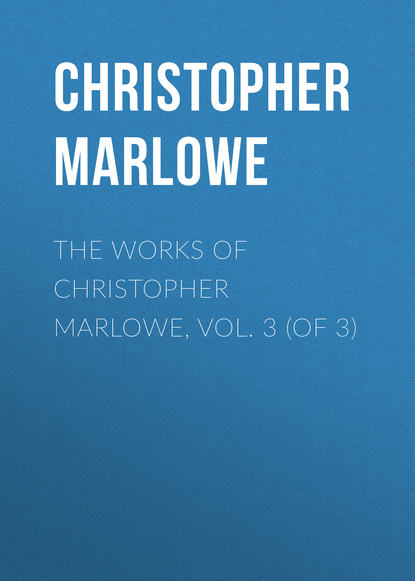 Полная версия
Полная версияThe Works of Christopher Marlowe, Vol. 3 (of 3)
645
"Numerisque moventibus astra."—The word "planeting" was, I suppose, coined by Marlowe. I have never met it elsewhere.
646
So Dyce.—Old ed. "radge." (The original has "et incerto discurrunt sidera motu.")
647
"Omnis an effusis miscebitur unda venenis."—Dyce suggests that Marlowe's copy read "pruinis."
648
The original has "Aquarius."—Ganymede was changed into the sign Aquarius: see Hyginus' Poeticon Astron. II. 29.
649
Claws.
650
A Mænad.—Old ed. "Mænus."
651
The original has "Nubiferæ."
652
Old ed. "hence."
653
This delightful pastoral song was first published, without the fourth and sixth stanzas, in The Passionate Pilgrim, 1599. It appeared complete in England's Helicon, 1600, with Marlowe's name subscribed. By quoting it in the Complete Angler, 1653, Izaak Walton has made it known to a world of readers.
654
Omitted in P. P.
655
So P. P.—E. H. "That vallies, groves, hills and fieldes."—Walton "That vallies, groves, or hils or fields."
656
So E. H.—P. P. "And the craggy mountain yields."—Walton "Or, woods and steepie mountains yeelds."
657
So E. H.—P. P. "There will we."—Walton "Where we will."
658
So E. H.—P. P. and Walton "And see."
659
So E. H. and P. P.—Walton "our."
660
So P. P. and Walton.—E. H. "sings."
661
So E. H. and Walton.—P. P. "There will I make thee a bed of roses."
662
So E. H.—P. P. "With."—Walton "And then."
663
This stanza is omitted in P. P.
664
So E. H.—Walton "Slippers lin'd choicely."
665
So E. H. and Walton.—P. P. "Then."—After this stanza there follows in the second edition of the Complete Angler, 1655, an additional stanza:—
"Thy silver dishes for thy meatAs precious as the gods do eat,Shall on an ivory table bePrepar'd each day for thee and me."666
This stanza is omitted in P. P.—E. H. and Walton "The sheep-heards swaines."
667
Oldys in his annotated copy (preserved in the British Museum) of Langbaine's Engl. Dram. Poets, under the article Marlowe remarks:—"Sir Walter Raleigh was an encourager of his [i.e. Marlowe's] Muse; and he wrote an answer to a Pastoral Sonnet of Sir Walter's [sic], printed by Isaac Walton in his book of fishing." It would be pleasant to think that Marlowe enjoyed Raleigh's patronage; but Oldys gives no authority for his statement.
668
From England's Parnassus, 1600, p. 480, where it is subscribed "Ch. Marlowe."
669
The text of England's Parnassus has "twindring," which is corrected in the Errata, to "twining."
670
First printed in The Alleyn Papers (for the Shakespeare Society), p. 8, by Collier, who remarks:—"In the original MS. this dramatic dialogue in verse is written as prose, on one side of a sheet of paper, at the back of which, in a more modern hand, is the name 'Kitt Marlowe.' What connection, if any, he may have had with it, it is impossible to determine, but it was obviously worthy of preservation, as a curious stage-relic of an early date, and unlike anything else of the kind that has come down to us. In consequence of haste or ignorance on the part of the writer of the manuscript, it has been necessary to supply some portions, which are printed within brackets. There are also some obvious errors in the distribution of the dialogue, which it was not easy to correct. The probability is that, when performed, it was accompanied with music."
671
MS. "Jack."
672
MS. "W. Fre."—which Dyce supposed to be an abbreviation for Wench's Friend.
673
MS. "Frend."
674
MS. "Wen" (i.e. Wench).
675
MS. "Wen."
676
Bauble.
677
In the Introduction I have expressed my opinion that this ballad is a forgery.
678
We are to suppose an allusion to Robert Greene.
679
The anagram of Marlowe.
680
This is the original title, which has been partly scored through to make way for the following title:—A Note delivered on Whitson eve last of the most horrible blasphemes utteryd by Christofer Marly who within iii dayes after came to a soden and fearfull end of his life.
681
Words printed in italics are scored through in the MS.
682
Where lacunæ occur the clauses are unfit for publication.
683
Where lacunæ occur the clauses are unfit for publication.
684
Where lacunæ occur the clauses are unfit for publication.
685
In the margin are the words "he is layd for,"—i.e., steps are being taken for his apprehension.
686
Quoted.
687
The inverted iron horns or tubes, a few of which still remain on lamp-posts and gates, were formerly used as extinguishers to the torches which were thrust into them.



